Sam Staley • Tuesday, February 6, 2018 •
 February is African-American History Month in the United States and Canada. This series of events celebrating African-American achievements and their experience has been controversial since it was founded by historian Carter G. Woodson on a smaller scale as Negro History Week in 1926. Nevertheless, regardless of where one falls on its importance, the month provides an opportunity to think more deeply about the diverse and varied experiences of people of African descent in the U.S. as well as other minorities. One way to examine this experience is through the provocative lens of narrative film.
February is African-American History Month in the United States and Canada. This series of events celebrating African-American achievements and their experience has been controversial since it was founded by historian Carter G. Woodson on a smaller scale as Negro History Week in 1926. Nevertheless, regardless of where one falls on its importance, the month provides an opportunity to think more deeply about the diverse and varied experiences of people of African descent in the U.S. as well as other minorities. One way to examine this experience is through the provocative lens of narrative film.
Several excellent recent movies explore important dimensions of African-American history in nuanced and layered ways. These films tend to take a more holistic approach to racial injustices and African-American life, diving deep into the experiences of individuals, families, and class.
Below are five movies released in 2016 and 2017 that depict important aspects of the African-American experience in cultural, economic, and legal contexts that still resonate in contemporary America. These are narrative films, not documentaries, so readers are encouraged to follow the links to the lengthier reviews which discuss the historical accuracy of the stories and other key source material. They are definitely worth queuing up on Netflex, Amazon, or the DVD player.
Mary Theroux • Sunday, February 4, 2018 •
 A recently released report reveals that projections of revenues meant to offset some of Obamacare’s costs were as flawed as its projections for lower health insurance premiums and healthcare costs. And taxpayers should brace themselves for yet another bailout: this time of the federal student loan program.
A recently released report reveals that projections of revenues meant to offset some of Obamacare’s costs were as flawed as its projections for lower health insurance premiums and healthcare costs. And taxpayers should brace themselves for yet another bailout: this time of the federal student loan program.
An often-forgotten provision of Obamacare, a/k/a the Affordable Care Act (ACA), was its take-over of the federal student loan program, with claims that doing so would provide vast financial windfalls to help offset the ACA’s costs: $61 billion over 10 years, according to the Congressional Budget Office (CBO). Before the ACA, about half of federal student loans originated with private lenders while being guaranteed by the government. With the passage of the Act, the government became both the lender and the guarantor.
Randall Holcombe • Thursday, February 1, 2018 •

As all presidents do in their State of the Union address, President Trump told listeners that the state of our union is strong. Unlike many past State of the Union addresses, that appeared to be his main message.
He began by talking about American heroes who responded to natural disasters and shootings, followed by a recounting of the strength of the economy. He mentioned our resurgent energy industry, manufacturing growth, the booming stock market and the plummeting unemployment rate. Those are comments on America; not American government.
Politicians typically talk in terms of aspirations rather than policies. They talk about goals they would like to accomplish (or have others accomplish) rather than actual policies that could realize their aspirations. While the president’s talk shared this characteristic, he did offer some concrete policy recommendations.
The place where he was most specific was immigration policy, where he described four pillars of his plan: a path to citizenship for those brought here as children, securing the border (this sounds more like an aspiration than a policy), ending the visa lottery system, and ending chain migration.
Sam Staley • Wednesday, January 31, 2018 •
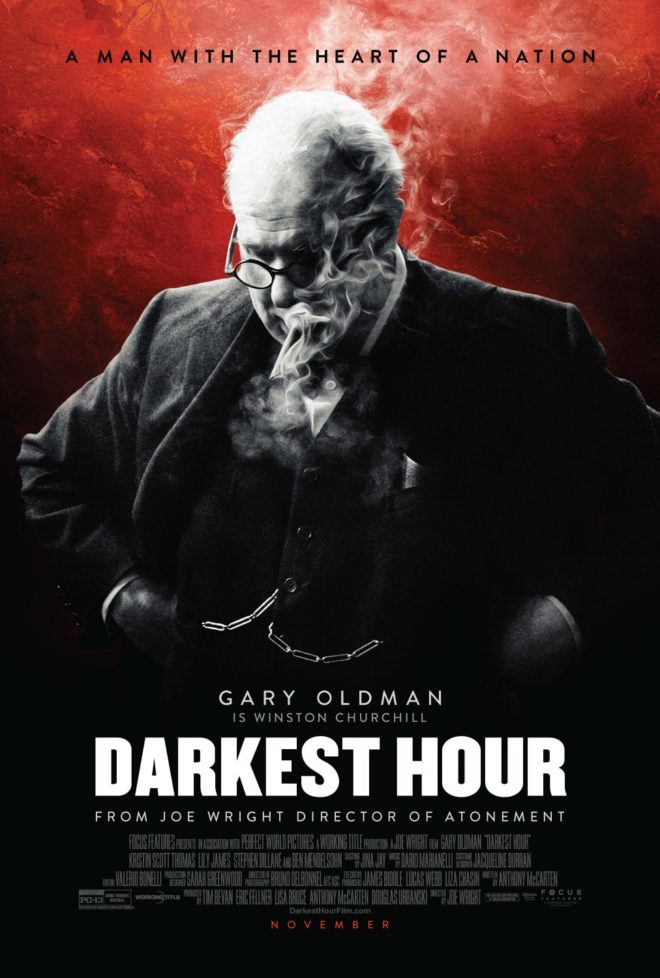 Darkest Hour probes the depths of political courage under overwhelming odds, focusing on the first few months of Winston Churchill‘s leadership as Prime Minister during World War II. The movie also presents a dilemma. On the one hand, Churchill experts have challenged the historical accuracy of several broad themes and characterizations (see here and here). On the other hand, the movie is excellent, in no small part to the stellar (and award-winning) performance of Gary Oldman (Harry Potter series, Tinker Tailor Soldier Spy, Dawn of the Planet of the Apes) in the role of Churchill.
Darkest Hour probes the depths of political courage under overwhelming odds, focusing on the first few months of Winston Churchill‘s leadership as Prime Minister during World War II. The movie also presents a dilemma. On the one hand, Churchill experts have challenged the historical accuracy of several broad themes and characterizations (see here and here). On the other hand, the movie is excellent, in no small part to the stellar (and award-winning) performance of Gary Oldman (Harry Potter series, Tinker Tailor Soldier Spy, Dawn of the Planet of the Apes) in the role of Churchill.
The specific events were real enough. Europe was collapsing under the weight of Hitler’s military in 1940, including the occupations of Poland, Denmark, and Norway . The diplomatic tactics of Neville Chamberlain (Ronald Pickup, The Best Exotic Marigold Hotel, The Time of Their Lives) had done little more than enable Hitler’s boldness, prompting him to resign as Prime Minister. Churchill is recommended by Parliament as the compromise candidate. No one else seemed acceptable to the major parties. At the time, Churchill was the First Lord of the Admiralty, the politically appointed head of the Royal Navy.
Robert Higgs • Tuesday, January 30, 2018 •
 Okay, let’s suppose you hate Mexicans, Haitians, Hondurans, and all the other foreigners trying to get out of their wretched places and into the USA—obviously lots of people do hate them. So naturally you want the authorities to take whatever measures they deem necessary to keep these people out—walls, border thugs, internal checkpoints, whatever it takes. Okay, so far, so good (given your hateful values).
Okay, let’s suppose you hate Mexicans, Haitians, Hondurans, and all the other foreigners trying to get out of their wretched places and into the USA—obviously lots of people do hate them. So naturally you want the authorities to take whatever measures they deem necessary to keep these people out—walls, border thugs, internal checkpoints, whatever it takes. Okay, so far, so good (given your hateful values).
Except that this “benefit” you want the government to give you has a cost. And I’m not referring merely to the scores of billions of taxpayer dollars it will pour into its “secure the borders” rat holes. I’m thinking of the way in which the government will extend its police/surveillance systems into every nook and cranny of the USA—into every employer’s business, into every financial transaction, into every movement of vehicles on the highways, into every email or snail mail that is sent, into what is said in private houses and apartments themselves (the cops are already equipped with the listening technology).
So, as Kant taught, he who wills the ends wills the means, inescapably. To satisfy your hatred of disagreeable aliens, you are asking for the government to turn the USA into a police state on steroids. Are you really willing to pay this price to sate your bigotry?
***
Robert Higgs is Senior Fellow in Political Economy at the Independent Institute and Editor at Large of The Independent Review. His latest book is Taking A Stand: Reflections on Life, Liberty, and the Economy.
Robert Higgs • Monday, January 29, 2018 •
 I live in a very remote place, even by Mexican standards. The nearest fair-sized city, Chetumal, is about 125 miles away, and one needs about two and a half hours or more to get there by car. Nearby shopping is extremely limited. A few grocery items may be purchased in the village of Xcalak. The closest gas station is in Mahahual, about 43 miles from my house, where one may also buy hardware and building supplies. Living here in Xcalak would be a very Spartan experience were it not for Lucio, from whom I buy fresh produce and other foodstuffs three times each week at my gate (and for another grocery seller, who comes on the days when Lucio does not).
I live in a very remote place, even by Mexican standards. The nearest fair-sized city, Chetumal, is about 125 miles away, and one needs about two and a half hours or more to get there by car. Nearby shopping is extremely limited. A few grocery items may be purchased in the village of Xcalak. The closest gas station is in Mahahual, about 43 miles from my house, where one may also buy hardware and building supplies. Living here in Xcalak would be a very Spartan experience were it not for Lucio, from whom I buy fresh produce and other foodstuffs three times each week at my gate (and for another grocery seller, who comes on the days when Lucio does not).
Lucio lives in Bacalar, a town about a hundred miles away. Three times each week he rises at 4:00 a.m. and goes to the New Market in Chetumal, where he buys a fairly extensive variety of foodstuffs. He then hauls them to Xcalak and peddles them in the village and along the beach road where I live. He usually arrives at my gate around noon. If we want something he does not ordinarily sell, we ask him to bring it, and he usually manages to do so on his next trip. He is a keen merchant: he quickly learns what items one is interested in buying, and he remembers items he hasn’t been able to get recently and calls them to the customer’s attention when he has them again. He conducts this trade from a pickup truck that is far from the latest model, and whenever he fails to come as usual—which is a rare occurrence—it is always because the truck has broken down. As a rule he is extraordinarily reliable and punctual. (The latter is not something always on display in the land of “Mexico time.”)
Randall Holcombe • Friday, January 26, 2018 •
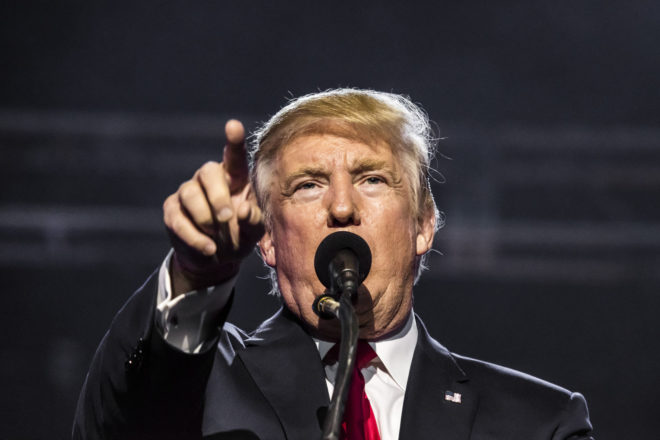 At the Davos World Economic Forum, President Trump urged global investors to invest in the United States. “I’m going to Davos. We’re going to be talking about investing in the United States again,” said the president.
At the Davos World Economic Forum, President Trump urged global investors to invest in the United States. “I’m going to Davos. We’re going to be talking about investing in the United States again,” said the president.
That would be good for Americans. More investment increases productivity, which boosts our standard of living. But where will those global investors get the dollars to invest here? Foreign investors earn dollars which they can then invest in the United States by selling goods to Americans for dollars. The more goods foreigners sell to us, the more dollars they acquire which can then be invested in the American economy.
So, while President Trump is telling global investors to invest here, his policies that aim to limit imports into the US (such as the recent tariffs he announced on Korean washing machines and solar panels) will reduce foreign imports into the United States, and so reduce the dollars global investors have to make those investments.
His words say, invest in America. His actions say otherwise.
Sam Staley • Thursday, January 25, 2018 •
 Molly’s Game, the new film with a snappy, Oscar-nominated screenplay by Aaron Sorkin (of West Wing and The Social Network fame), practically bubbles over with pro-liberty themes, from the irreverent lead character striking out on her own in an ethically suspect underground economy to the prosecutorial abuse used to coerce “Hollywood poker princess” Molly Bloom into confessing to crimes she did not commit. Based on a true story, the movie appears to be a faithful adaptation of Bloom’s memoir, Molly’s Game: From Hollywood’s Elite to Wall Street’s Billionaire Boys Club, My High-Stakes Adventure in the World of Underground Poker. In the hands of Sorkin, who also directs the film, Molly’s Game is engaging, entertaining, and a provocative indictment of the criminal-justice system as well as a coming of age story of a twenty-something.
Molly’s Game, the new film with a snappy, Oscar-nominated screenplay by Aaron Sorkin (of West Wing and The Social Network fame), practically bubbles over with pro-liberty themes, from the irreverent lead character striking out on her own in an ethically suspect underground economy to the prosecutorial abuse used to coerce “Hollywood poker princess” Molly Bloom into confessing to crimes she did not commit. Based on a true story, the movie appears to be a faithful adaptation of Bloom’s memoir, Molly’s Game: From Hollywood’s Elite to Wall Street’s Billionaire Boys Club, My High-Stakes Adventure in the World of Underground Poker. In the hands of Sorkin, who also directs the film, Molly’s Game is engaging, entertaining, and a provocative indictment of the criminal-justice system as well as a coming of age story of a twenty-something.
Molly Bloom (Jessica Chastain, Zero-Dark Thirty, Miss Sloane, The Zookeeper’s Wife) was a competitive freestyle skier, ranking third in North America and a US Olympic hopeful. In the movie, Bloom has a career-ending injury that prompts her to leave Colorado and start a new life in Los Angeles and away from her domineering and verbally abusive father, Larry (Kevin Costner, Dances With Wolves, Bull Durham, Hidden Figures). She begins working for Dean Keith (Jeremy Strong, Zero Dark Thirty, The Big Short, Lincoln), a real-estate agent, who has connections to a high-stakes underground poker game. He coerces her into assisting him in managing the game. She is paid on tips, rather than wages, allowing Keith to skirt labor laws as well as keep the game underground. When Keith realizes she is making a lot money from tips, he caps her take and threatens to fire her if she objects.
Randall Holcombe • Wednesday, January 24, 2018 •
For most of human history, mankind’s standard of living remained perilously close to a bare subsistence level. Then, a few hundred years ago, capitalism brought with it the Industrial Revolution that has generated unprecedented economic progress. Capitalism is by far the most effective anti-poverty program in the world’s history.
Prior to the Industrial Revolution, economic progress was so slow that people would not be able to recognize it in their lifetimes. The goods and services they consumed, the ways in which they were produced, and the overall level of consumption would have been roughly the same when they died as when they were born. Today, we take economic progress for granted. Ten years from now, cars will be different, phones will be different, our lives and lifestyles will be different because of the economic progress generated by capitalism.
Vicki Alger • Monday, January 22, 2018 •
 Just in time for National School Choice Week, a new national poll finds that close to two-thirds of Americans favor school choice and bold reforms. Hopefully, California lawmakers are listening.
Just in time for National School Choice Week, a new national poll finds that close to two-thirds of Americans favor school choice and bold reforms. Hopefully, California lawmakers are listening.
The American Federation for Children’s Fourth Annual School Choice Survey polled 1,100 likely November 2018 voters and found 63 percent of respondents support the concept of school choice, including 41 percent who “strongly” support it.
The survey was conducted by Beck Research, a respected Democratic polling firm whose previous clients include the National Education Association (see here, here, and here), the country’s largest teachers union and the parent organization of the California Teachers Association—both staunch opponents of school choice (see here and here).
 February is African-American History Month in the United States and Canada. This series of events celebrating African-American achievements and their experience has been controversial since it was founded by historian Carter G. Woodson on a smaller scale as Negro History Week in 1926. Nevertheless, regardless of where one falls on its importance, the month provides an opportunity to think more deeply about the diverse and varied experiences of people of African descent in the U.S. as well as other minorities. One way to examine this experience is through the provocative lens of narrative film.
February is African-American History Month in the United States and Canada. This series of events celebrating African-American achievements and their experience has been controversial since it was founded by historian Carter G. Woodson on a smaller scale as Negro History Week in 1926. Nevertheless, regardless of where one falls on its importance, the month provides an opportunity to think more deeply about the diverse and varied experiences of people of African descent in the U.S. as well as other minorities. One way to examine this experience is through the provocative lens of narrative film.














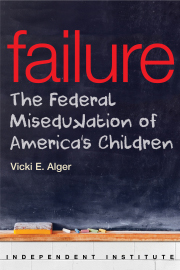
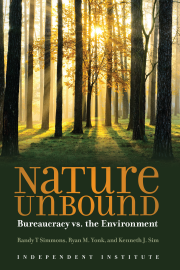
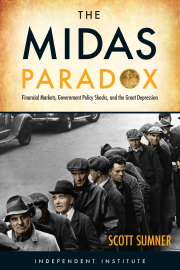


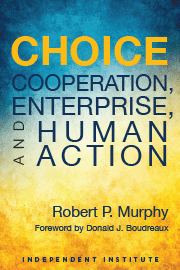
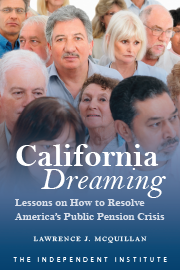


 A recently released report reveals that projections of revenues meant to offset some of Obamacare’s costs were as flawed as its projections for lower health insurance premiums and healthcare costs. And taxpayers should brace themselves for yet another bailout: this time of the federal student loan program.
A recently released report reveals that projections of revenues meant to offset some of Obamacare’s costs were as flawed as its projections for lower health insurance premiums and healthcare costs. And taxpayers should brace themselves for yet another bailout: this time of the federal student loan program.

 Okay, let’s suppose you hate Mexicans, Haitians, Hondurans, and all the other foreigners trying to get out of their wretched places and into the USA—obviously lots of people do hate them. So naturally you want the authorities to take whatever measures they deem necessary to keep these people out—walls, border thugs, internal checkpoints, whatever it takes. Okay, so far, so good (given your hateful values).
Okay, let’s suppose you hate Mexicans, Haitians, Hondurans, and all the other foreigners trying to get out of their wretched places and into the USA—obviously lots of people do hate them. So naturally you want the authorities to take whatever measures they deem necessary to keep these people out—walls, border thugs, internal checkpoints, whatever it takes. Okay, so far, so good (given your hateful values). I live in a very remote place, even by Mexican standards. The nearest fair-sized city, Chetumal, is about 125 miles away, and one needs about two and a half hours or more to get there by car. Nearby shopping is extremely limited. A few grocery items may be purchased in the village of Xcalak. The closest gas station is in Mahahual, about 43 miles from my house, where one may also buy hardware and building supplies. Living here in Xcalak would be a very Spartan experience were it not for Lucio, from whom I buy fresh produce and other foodstuffs three times each week at my gate (and for another grocery seller, who comes on the days when Lucio does not).
I live in a very remote place, even by Mexican standards. The nearest fair-sized city, Chetumal, is about 125 miles away, and one needs about two and a half hours or more to get there by car. Nearby shopping is extremely limited. A few grocery items may be purchased in the village of Xcalak. The closest gas station is in Mahahual, about 43 miles from my house, where one may also buy hardware and building supplies. Living here in Xcalak would be a very Spartan experience were it not for Lucio, from whom I buy fresh produce and other foodstuffs three times each week at my gate (and for another grocery seller, who comes on the days when Lucio does not). At the Davos World Economic Forum, President Trump urged global investors to invest in the United States. “I’m going to Davos. We’re going to be talking about investing in the United States again,”
At the Davos World Economic Forum, President Trump urged global investors to invest in the United States. “I’m going to Davos. We’re going to be talking about investing in the United States again,” 
 Just in time for
Just in time for